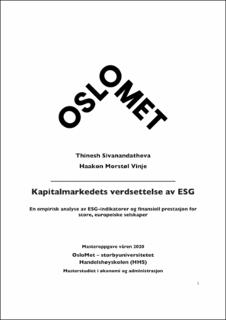| dc.contributor.advisor | Belsom, Einar | |
| dc.contributor.author | Vinje, Haakon Morstøl | |
| dc.contributor.author | Sivanandatheva, Thinesh | |
| dc.date.accessioned | 2021-10-21T08:52:25Z | |
| dc.date.available | 2021-10-21T08:52:25Z | |
| dc.date.issued | 2020 | |
| dc.identifier.uri | https://hdl.handle.net/11250/2824412 | |
| dc.description.abstract | Vi analyserer hvilke sammenhenger miljøprestasjoner, sosial ansvarlighet og selskapsstyring, målt med ESG-indikatorer, har på finansiell prestasjon i et panel bestående av 263 store i perioden 2012-2018. Vi anvender en fixed-effect modell med tobin´s Q og ROA som avhengig variabel. Resultatene indikerer at ESG har en positiv effekt både på tobin´s Q og ROA for store europeiske selskaper. Ved å bryte ned ESG-rammeverket undersøker vi om det er en sammenheng mellom komponentene til ESG og finansiell prestasjon og hvilken komponent som gir en størst effekt. Resultatene viser at både E- og S-komponenten har en statistisk signifikant effekt både på tobin´s Q og ROA, men S-komponenten har størst effekt. G-komponenten har ingen signifikant sammenheng med finansiell prestasjon. Videre undersøker vi de signifikante komponentene, og finner indikasjoner på at underdriverne Resorce use, Community og Responsibility har statistisk signifikans effekt på selskapenes finansielle prestasjoner. Resultatene indikerer at ESG-aktiviteter er verdiskapende og ESGvurderinger er en ikke-finansiell variabel som gir informasjon utover de tradisjonelle finansielle måltallene. Basert på dette støtter studien stakeholder theory | en_US |
| dc.description.abstract | We analyze the relationship between environmental performance, social responsibility and corporate governance, measured by ESG indicators, on financial performance in a panel of 263 large companies over the period 2012-2018. We use a fixed-effect model with tobin's Q and ROA as dependent variables. The results indicate that ESG has a positive effect on both tobin's Q and ROA for large European companies. By decomposing the ESG framework, we investigate whether there is a relationship between the components of ESG and financial performance and which component has the greatest impact. The results show that both the E- and S-components have a statistically significant effect on both the tobin ́s Q and ROA, but the S-component has the greatest effect. The G-component has no significant correlation with financial performance. Further, by breaking down the significant components, we find indications that the sub-categories Resource use, Community and Responsibility have a statistical significant effect on the companies' financial performance. The results indicate that ESG-activities are value-creating and ESG-score is a non-financial variable that provides information beyond traditional financial measurements. Based on this, the study supports stakeholder theory | en_US |
| dc.language.iso | nob | en_US |
| dc.publisher | OsloMet – storbyuniversitetet | en_US |
| dc.subject | ESG | en_US |
| dc.subject | Miljøprestasjioner | en_US |
| dc.subject | Sosial ansvarlighet | en_US |
| dc.subject | Selskapsstyring | en_US |
| dc.subject | Finansiell prestasjon | en_US |
| dc.title | Kapitalmarkedets verdsettelse av ESG. En empirisk analyse av ESG-indikatorer og finansiell prestasjon for store, europeiske selskaper | en_US |
| dc.type | Master thesis | en_US |
| dc.description.version | submittedVersion | en_US |
